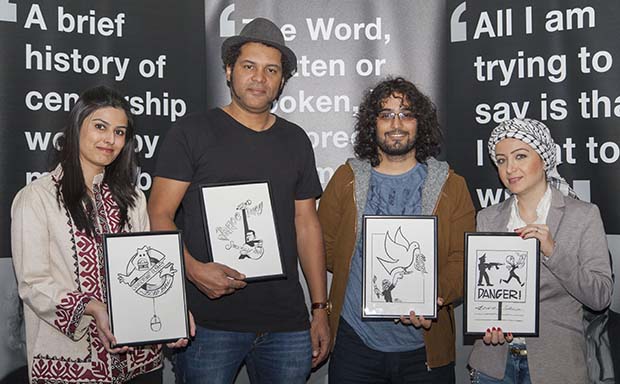4 Oct 2016 | Asia and Pacific, Awards, China, Fellowship, Fellowship 2016, mobile, News and features

In April 2016 the US government called China’s Great Firewall a barrier to trade. This came just months after the US criticised China for cyber spying on American companies, or what the Justice Department called the “great brain robbery”.
“Obama keeps saying that if China continues employing its hacking units to attack US companies, America will tear down the Great Firewall,” Charlie Smith, co-founder of GreatFire, the anonymous group of individuals who work towards circumventing China’s Great Firewall and winners of the 2016 Index on Censorship Freedom of Expression Award for digital activism, told Index. “Great – so tear it down, let’s go.”
But it’s not happening, Smith added.
Over on the other side of America’s political spectrum, US senator Ted Cruz has been busy over the last month trying to get the US Congress to act to “prevent the Obama administration from giving the internet” to China. Cruz failed in his mission, as on 1 October the US gave up its remaining control over the internet, with the California-based Internet Corporation for Assigned Names and Numbers (ICANN) no longer under the direction of the Department of Commerce.
There are now fears that the change will open the door for authoritarian governments, including China’s, to get control of the network of networks, leading to greater censorship.
In Cruz’s first letter to ICANN, kicking off his attempt to stop the move, the former presidential hopeful quoted GreatFire’s research into internet censorship in China.
“I then reached out to them and said: ‘Hey, we’re GreatFire, what more do you want to know?’” Smith said. “ICANN has a representative in Beijing and that representative sits in the Cyberspace Administration office, which is censorship central, so Cruz’s campaign was very interested in that.”
Although GreatFire would not align themselves with a political party, Smith added that if Cruz really believes what he is saying and GreatFire can help, the organisation will support him on this issue.
GreatFire’s own efforts to put a hole in China’s firewall took a new turn in July 2016 with the launch of its groundbreaking new site to test virtual private networks within the country, Circumvention Central. “Stable circumvention is a difficult thing to find in China so this new site a way for people to see what’s working and what’s not working,” Smith told Index at the time.
Speaking three months on, Smith told us that although the site works and customers are overwhelmingly pleased with the service, it isn’t making as many sales as he’d hoped it would. In August the platform sold a few dozen subscriptions but Smith was really hoping to see numbers in the hundreds by this stage.
“Maybe we’re not getting enough people to the site,” Smith said. “I guess it’s timing too; people have other subscriptions that haven’t yet expired, so they’re not ready.”
“What we have done, however, is engaged with some VPN firms like a paid consultancy service and helped them improve what they are doing,” Smith added. “It’s actually been quite revealing because we can see the volatility in the market and how one service may work really well this month and next month it will basically be useless.”
GreatFire is working closely with VPN services Hide My Ass and AnchorFree, both of whom have been introductions from Index on Censorship.
The Chinese government has taken notice of Circumvention Central, sending an email to all VPN providers listed on the site asking them not to stop operating in China but to cease working with GreatFire specifically.
One reads: “Please immediately stop working with GreatFire.org. GreatFire.org is an anti-China website as declared by the Cyberspace Administration of China. We hereby express our strong concern and request you stop working with GreatFire at the earliest time possible.”
“So there’s no real serious threat from the government there,” Smith said, adding that although Chinese authorities are constantly trying to take down or attack the site, they have been wholly unsuccessful.
GreatFire is also working on its free internet browser that allows users to access content that’s behind China’s firewall. The browser is currently available in English and Chinese, but will soon be available in traditional Chinese, Arabic, Spanish, Croatian and Persian.
“We’re currently looking for publications in those languages that are blocked so we can help provide access,” said Smith.
The main focus for the future, however, is the VPN service. “We believe we have the best circumvention tool on the market and we want to show people how it works and drive adoption.”
Also read:
Smockey: “We would like to trust the justice of our country”
Zaina Erhaim: Balancing work and family in times of war
Artist Murad Subay worries about the future for Yemen’s children
Nominations are now open for 2017 Index on Censorship Freedom of Expression Awards. You can make yours here.
28 Jan 2016 | Magazine, mobile, Volume 44.04 Winter 2015 Extras

Kunle Olulode, Max Wind-Cowie, Jodie Ginsberg and Shazia Mirza at last night’s debate (Photo: Sean Gallagher / Index on Censorship)
“When I went to the Loaded offices with hairy legs they told me to get out and that I could never be on the cover of the magazine because apparently I’d made an effort with my nails but not my legs,” said comedian Shazia Mirza, at the launch of the latest taboo-themed issue of Index on Censorship magazine.
Do taboos still exist in society today? Are taboo subjects still brushed under the carpet instead of being faced head on? Is comedy a perfect platform to tackle these issues? These were just some of the questions discussed during the evening of discussion and debate.
Chaired by Index on Censorship chief executive Jodie Ginsberg, panellists included Kunle Olulode, director of campaigning charity Voice4Change England, writer and political consultant Max Wind-Cowie, plus comedians Grainne Maguire and Mirza.
The night kicked off with a fast and furious comedy performance from Michele Moran, filled with tales of taboos and secrets.
Wind-Cowie told the audience at the Royal Vauxhall Tavern of his surprise when people reacted to Rupert Murdoch and Jerry Hall’s marriage with jokes and disgust at the thought of older people having sex.

Index on Censorship’s CEO Jodie Ginsberg with comedians Shazia Mirza and Grainne Maguire (Photo: Sean Gallagher / Index on Censorship)
He said: “I think it’s a bit sad because I hope to be an older person one day, and I hope that the older person that I will become will be allowed to have sex with someone. And I hope that when we are having sex they won’t be looking at me and thinking ‘my God you’ve got disgusting’. So I think it’s wrong that it’s something we all laugh at so much.”
Maguire joked to the audience that mental illness was a requirement as a comedian but agreed there was still a lot of stigma around mental health.
“In certain careers you’re supposed to be macho and mental illness is still seen as a sign of weakness. I just think that’s really depressing and sad. I think you should be allowed to be vulnerable, but I don’t think were there yet,” she said.
The panel moved to discussing whether suicide and grief were taboo in different societies. Mirza said: “Some Muslims believe that suicide is wonderful. You blow yourself up and go into the afterlife where there are virgins and wine. So it may be terrible in the West but to Muslims suicide is great, and we talk about it all the time.”
Olulode told the audience how for him the last taboo was racism. “In terms of race, there’s a lot of discussion about the discrimination and the attitudes towards black people, but we rarely discuss the construction of what it is to be white.”
He said: “There’s an old left-wing saying: ‘Nothing is alien to me.’ And that idea of investigating every aspect of humanity seems to have become lost along the way. The contestation of ideas in society today is more about protecting people from being exposed to difficult subjects or ideas than actually tackling them head on.”
The evening was rounded off with a lively taboo disco set from DJ Bamboo.
9 Apr 2013 | Egypt, Uncategorized
Egypt is taking steps to enforce a ban on internet porn ordered by a Cairo court late last year. The ban was first ordered three years ago, but went unimplemented. This time it looks like it’s going to happen, and it won’t be cheap: the necessary filtering system will cost the country’s government 25 million Egyptian pounds (about £2.4 million).
According to Sherif Hashem, deputy head of the National Telecom Regulatory Authority, Egypt has been installing the filters since January.
Amr Gharbeia, civil liberties director for the Egyptian Initiative for Personal Rights (EIPR) told Index that, “there is very little information on Egypt’s censorship and deep packet inspection capabilities. So far, Egypt’s non-independent National Telecom Regulation Authority (NTRA) has claimed Egypt’s telecom ecosystem does not have this kind of equipment, and that it is not in its mandate as a regulator to filter content.”
News of the ban comes at a time when the country’s Islamist leadership is facing a host of post-revolution problems: Egypt’s unemployment rate has now reached 13 per cent. In the past two years the country’s foreign reserves have gone from £23.5 billion to £8.5 billion. This past weekend saw sectarian clashes outside of a Coptic Christian cathedral in Cairo, with at least eight dead, and many injured. Unsurprisingly, President Mohamed Morsi’s approval rating has reached an all-time low.
Egypt is currently negotiating a $4.8 billion IMF loan, which requires that the country decrease subsidies and increase taxes. Last month, officials announced that subsidised bread would be rationed — a decision that sparked angry protests from bakers. While this isn’t the first time that Egypt has faced protests for increased bread prices, the move flies in the face of one of the Muslim Brotherhood’s main principles: alleviating poverty.
So with all of Egypt’s social and economic woes — why enforce a costly ban on porn now? Gharbeia told Index that the Muslim Brotherhood “is caught between a rock and a hard place, and is finding great difficulty trying to appease to the more conservative currents and the more liberal groups.”
An improved filtering system might mean that Egypt could implement bans that have previously gone unimplemented, due to technical difficulties. In February, an Egyptian court ordered that YouTube be banned for 30 days, for refusing to remove anti-Islam film, the Innocence of Muslims. The ban was eventually thrown out. Gharbeia said that while a ban on the video-sharing site is “unlikely and very costly”, “it is not impossible in the future, if socially conservative powers remain in power and continue to be the majority in parliament.” Egypt has postponed parliamentary elections to October this year.
Sara Yasin is an editorial assistant at Index. She tweets from @missyasin.




